Stephen Roney's Blog, page 282
October 22, 2019
Canadian Federal Election: The Hangover

I am not surprised by the Canadian election results. They are about as the polls predicted. But they are saddening.
Sad that Trudeau has been re-elected, with a not-all-that-much-reduced caucus after SNC-Lavalin. That suggests a tolerance for corruption in our government which will surely encourage its spread.
Sad that Maxime Bernier lost his seat. He was the voice of honesty in our parliament and politics. He was the only one speaking on some important issues. Honesty was punished. This will discourage its spread. I fear he may give up the fight; although on election night he said the PPC carries on.
Sad that Lisa Raitt lost her seat. She was an important voice, perhaps THE voice, for decency and tolerance beyond partisanship in our politics. Our civil discourse has already become demented. This will encourage it to get worse. Mudslinging is now rewarded; respecting your political opponents is punished.
Sad that the BQ has surged, and the NDP declined, in Quebec. So much for a return to healthy normalcy in Quebec politics. Back to the endless barren impoverishing fight over sovereignty and mutual regional antagonism. Bernier’s loss is alarming for the same reason.
Sad in the same way that Ralph Goodale lost his seat. The Liberals will now be in government, with no prominent voices from Alberta or Saskatchewan. Just what we need—renewed Western alienation.
Sad that Jane Philpott lost her seat. Like Bernier, a lonely voice for honesty in our politics, and punished for it. First by her party, now by the electors. We won’t now see such honour soon again.
Sad too that nobody’s results were so bad as to prompt a leadership change. All of them can now justify staying on. The lack of inspiring leadership at the federal level is itself gravely dangerous for Canadian unity.
In fact, the result shows just how important Stephen Harper’s leadership was as PM. As soon as he was voted out, all hell is breaking out. All the divisions that seemed to rather quickly dissipate when he took charge are reappearing.
'Od's Blog: Catholic and Clear Grit comments on the passing parade.
Published on October 22, 2019 06:28
October 20, 2019
Final Election Prediction
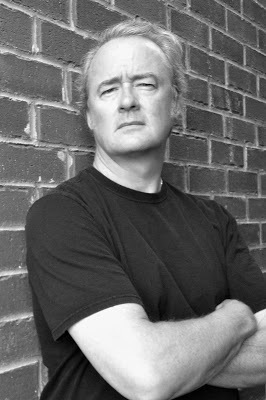 Warren Kinsella.
Warren Kinsella.I called the last Canadian election wrong. I thought the highest likelihood, as I recall, was for a Conservative minority. If not, an NDP minority. But then, most people got it wrong.
So, one day out, what about this time?
I expect a weak Liberal minority.
That is what the polls predict. The polls, we find recently, can be wrong, and they tend consistently to be wrong in the same direction: they underestimate the conservative vote.
But I think Scheer may have been hurt by the last-minute revelation that he was paying Warren Kinsella to subvert the PPC.
That sends a bad message to Scheer’s base. Firstly, a lot of them have been sympathetic to Bernier’s platform, but planning to vote Conservative strategically. This revelation underlines the sense that there really is no difference between the Tories and the Liberals anyway: in the backrooms, Scheer was in cahoots with an arch-Liberal operative. They’re all the same bunch, it seems. And he was hiring Kinsella to push the same divisive message as the Liberals, that those on the right were all “racists.” A false claim enough conservative voters have themselves been victimized by. To this basket of deplorables, Scheer must now look like an enemy agent. Or at best, someone you cannot trust.
At the same time, this tends at a stroke to discredit any and all charges against the PPC of racism. One must now assume they were all mocked up by Kinsella. Many people may now give them a second look.
The likely result is that some of Scheer’s base will stay home, having lost their enthusiasm. Others will vote PPC when they would before have voted Tory for strategic reasons. This should shift a few percentage points away from the Conservatives, and in this race, a few percentage points are the whole hockey game.
For these times, I think Scheer chose the wrong campaign strategy. His idea was the old one, of triangulating to win the centre from Trudeau. My sense is this no longer works, because with social media, they can go back and see what you said before. Now, consistency counts more.
The polls seem to confirm this. Scheer’s attempts to fudge and shuffle to the middle have bought him nothing. His polling has not budged beyond the traditional Conservative base. The parties that have gained support through the campaign are the ideological ones: the NDP and the BQ.
Polls show the PPC so far down that I doubt they will elect anyone other than Bernier. But at least, with this last minute bombshell, they have the potential to surprise. For one thing, it puts them at the centre of attention just before the vote. It positions them as the one party to vote for to really buck the establishment. And the bogus label of racism is now discredited.
Perhaps the next question is who will be the new Conservative leader?
'Od's Blog: Catholic and Clear Grit comments on the passing parade.
Published on October 20, 2019 07:33
October 19, 2019
The Ontario English Curriculum
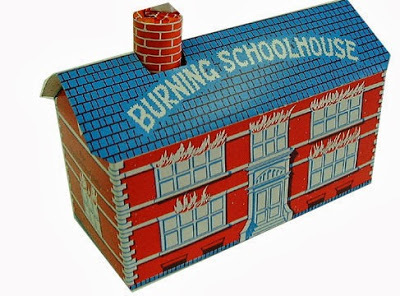
Looking over the Ontario high school English curriculum. It’s changed a fair bit from my student days. As it should have. Back when I went through, it was heavy on literature, and on narrative and poetry specifically. That suited me, but it was not practical. We were never even taught how to write an academic essay. We did not read any essays. Let alone the varieties of writing important in business and technical fields. We were taught nothing of rhetoric; outside Shakespeare, we did not read any great speeches. We did not debate or study argument. And no film or TV or radio or newspapers or magazines or comic books or songs. That was already out of touch with reality then—for this, not hardbound books, was where we absorbed the largest part of our English and English lit. It would be far weirder now, with YouTube, the Internet, and so on. And Bob Dylan winning the Nobel Prize.
You may argue that, from such a historically smaller sample, it is less likely for truly fine literature to be found in these newer media. Fair point; but at the same time, if you want fine literature in the future, you want to train upcoming writers in these living forms. Train them to write poetry and short stories, and they will live and die in garrets unread.
So it is good to see the curriculum expanded in this way:
“The reading program should include a wide variety of literary, informational, and graphic texts that engage students’ interest and imagination – for example, novels; poetry; myths, fables, and folk tales; short stories; textbooks and books on topics in science, history, mathematics, geography, and other subjects; biographies, autobiographies, memoirs, and journals; plays and radio, film, or television scripts; encyclopaedia entries; graphs, charts, and diagrams in textbooks or magazine articles; instructions and manuals; graphic novels, comic books, and cartoons; newspaper articles and editorials; databases and websites; and essays and reports.”
However, I suspect this has been done for the wrong reason, and so probably not well. The curriculum is now entirely skills-based; the point is to develop the skills needed for employment. This is no doubt why literature has been de-emphasized. This sounds reasonable, but E.D. Hirsh Jr. has demonstrated that learning only skills and not the specific content of a culture leaves one, by college level, illiterate. One needs a certain body of shared knowledge to make sense of a new text.
So it makes sense to pare this back to make more room for skills; but this makes the precise selection of the texts to be read all the more important. They had better be the real classics.
And for the rest, the curriculum is badly wrong.
Another of my frustrations back in the day was that the literature we got was always from England or from America. We did not get to see much Canadian writing, and I thought and still think that was alarming. Again you could argue that, with a much smaller pool from which to fish, the quality of Canadian materials would be lesser. But there is a second consideration: that was pretty discouraging for a Canadian kid who wanted to be a writer. The natural inference was that such things were not possible here. And it becomes a hard claim to sustain now that Alice Munro has won the Nobel Prize. Canlit has long seemed to be more popular abroad than at home. It’s the colonial mentality at work.
But that, sadly, has not changed. The curriculum now acknowledges the narrowness of featuring only British and American writers. So where does it go? Anywhere but Canada. “They should be exposed to literary works drawn from many genres, historical periods, and cultures.” Likely leaving even less room for the Canadian experience. The colonial mentality dies hard.
No wonder the damaging myth that “there is no Canadian mainstream.”
There is also an obvious problem with building an English curriculum on writings from non-English-speaking cultures. Valuable as they might be in some ways, they are in translation, and so are not models of English.
Okay, so what if you just have English writing set in other cultures, or featuring non-Anglophone protagonists?
Fine—cultural appropriation. You can’t win on that one.
Or choose pieces written by a tiny minority in the given country who are fluent in English. To begin with, you are automatically not getting an authentic perspective, then, but that of a Westernized elite who are just as likely to be out of touch with the real culture and ordinary life as any Western visitor. And you are fishing in a very small pond; quality is sure to be less.
And this need for diversity is an entirely fake problem. There is no need for intervention to make sure classes include texts reflecting unfamiliar backgrounds. Everywhere and at all times, an exotic locale and exotic characters are things readers automatically seek. Why else did Shakespeare set so many of his plays in Italy or Greece instead of Sussex? Why did Coleridge wrote of Xanadu? Why did Gulliver set sail instead of stay in Middlesex? Why are the James Bond movies always set in some exotic locale? Why do people want to read about cowboys or knights errant or Hobbits or Wookies and Ewoks? Because they reflect so well their own life experiences?
The likeliest result of the current curriculum is to introduce worse writing along with a boring sameness.
And that is only the beginning of the troubles with this new curriculum. Along with wanting to have something to reflect every race and culture, it also wants to balance selections to appeal to both males and females. That is, in principle, a good idea. Most things in schools today are cruelly biased against boys.
But they get this so wrong it is hard to believe it is not malicious.
“Resources should be chosen not only to reflect diversity but also on the basis of their appeal for both girls and boys in the classroom. Recent research has shown that many boys are interested in informational materials, such as manuals and graphic texts [they mean charts and graphs], as opposed to works of fiction, which are often more appealing to girls.”
This is just not credible to anyone who knows any actual boys. Both boys and girls equally like works of fiction. Girls like romances and fairy tales; boys like stories of adventure and hero legends. Both boys and girls find manuals, charts and graphs boring; but they both equally need to be able to read them for employment purposes.
 Image from The Boys' Book of Adventure. Note the exotic locale.
Image from The Boys' Book of Adventure. Note the exotic locale.So what this imaginary division suggests in practice is that all the interesting stuff is chosen for the girls’ taste. The boys get nothing.
Inevitably, the curriculum also wants to put something in for the LGBTQ lobby as well as feminists. “In inclusive programs, students are made aware of the historical, cultural, and political contexts for both the traditional and non-traditional gender and social roles represented in the materials they are studying.”
This is contradictory. By definition, non-traditional gender and social roles are not going to be commonly represented in the tradition. Forcing them into the curriculum will mean using inferior materials that do not reflect the cultural or historical context. Catch-22.
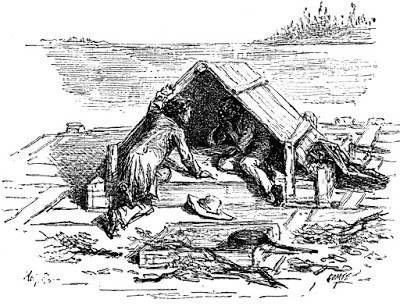 Inevitably, modern critics have decided Huckleberry Finn and Nigger Jim were having gay sex on their raft.
Inevitably, modern critics have decided Huckleberry Finn and Nigger Jim were having gay sex on their raft. Of course, this means that any fictional girl who dresses as a boy to be with her lover is now going to be declared transgender; and every story of a close male friendship is to be read as implying gay sex. Aside from doing serious violence to the texts, this is going to make sex seem far more important than it really is to students at an age when sex is already likely to unduly preoccupy them. And, with all due respect to homosexuals, a kind of sex that is unlikely to lead to a happy life. Gays themselves commonly make the point that the gay life is not a gay one: leaving aside any possible discrimination or vulnerability to disease, it becomes inestimably harder to find a life partner. And one has no children.
Another of the problems with the high school education I got is that we were never taught to think. I always thought that was deliberate. We were being indoctrinated instead, to make us useful cogs in the machine. We were never taught debate, or logic, or the logical fallacies, or parliamentary procedure, or the real scientific method. We were never taught to question what we read. If it was in the textbook, it was so.
So it is initially heartening to see the new curriculum refer to the need for “questioning the text.”
Unfortunately, this is only mentioned as one in a string of other “comprehension strategies”: “predicting, visualizing, questioning, drawing inferences, identifying main ideas, summarizing, and monitoring and revising comprehension.” That looks like lip service.
One of these things is not like the other ones. Studies show an average student can pick up how to predict, visualize, identify main ideas, and summarize from any text in one class hour. One lesson. Doing this tired little routine again and again with every class is just tiresome, tedious and brain-numbing. Great way to teach a kid to hate reading…
And later we learn what “questioning” means. It is not following and testing the logic, or close observation of the details for hints of deeper meanings—the two things that make reading worthwhile. It means “to look beyond the literal meaning of texts and to think about fairness, equity, social justice, and citizenship in a global society.”
In other words, it is not questioning the text at all, but imposing politics on it. Far from being taught how to think, the students are being more aggressively indoctrinated, in a particular political point of view.
This is a lazy way to dismiss a text without having to address it: you call it “racist,” and then you do not need to consider what it is saying. And it is again too easy to do to merit class time. Anyone can probably learn to do it in another hour.
And seeing everything as political is totalitarian.
Comprehending a text turns out not to be, according to this curriculum, discovering its meaning. Instead, such comprehension skills “help students understand that reading is a process of constructing meaning.”
Which means you get to decide it means whatever you (or the powers that be) want it to mean. That’s a trick that does not need to be taught at all. Anyone can do it without any training. You don’t even need to be lucid.
Teacher prompt: “How might audiences of different backgrounds listening to this radio drama interpret it differently?”
The goal of comprehension should be to establish the correct, or most plausible, understanding of the text, not to examine different ways it could be misinterpreted; at least without acknowledging that one or another reading must be a misinterpretation.
In evaluating a text, students are supposed to consider
“What information is omitted in order to sustain the point of view? Whose interests are served by this point of view?”
This seems to omit the possibility that any statement might actually be true. There is no truth, apparently, and all statements are to be accepted or rejected purely on whether they serve your interests. Or those of the powers who run the school.
So why have English studies abandoned meaning and comprehension? Why have they given over to what Jordan Peterson calls “cultural Marxism”?
I think the component of the Ontario curriculum on “media studies” gives us an essential clue.
Note, to begin with, that the term “media studies” is illiterate: text is a medium, just as is film. Whoever wrote the curriculum is just throwing everything that is not print into one undifferentiated barrel, without considering it properly.
When the document speaks about print, it specifies the need for “correctly applying the conventions of language – grammar, usage, spelling, and punctuation.” But when it turns to non-print media, the only concerns mentioned are:
“Students must be able to differentiate between fact and opinion; evaluate the credibility of sources; recognize bias; be attuned to discriminatory portrayals of individuals and groups, such as religious or sexual minorities, people with disabilities, or seniors; and question depictions of violence and crime.”
“Students’ repertoire of communication skills should include the ability to critically interpret the messages they receive through the various media.”
There is no special reason to study non-print media for this. All of these considerations are equally relevant to written texts. Why is this under “media studies”?
On the other hand, each medium has its own distinct grammar and vocabulary, comparable to but different from that of print: the mechanical and rhetorical considerations. Things like composing a page to draw the eye in a natural movement; or how to suggest the passage of time in a shot. And these are not even mentioned.
Why is this? Two reasons, I suspect, or two aspects of the same reason. First, in all probability, whoever put together the curriculum, and no doubt the average high school teacher too, figured they had to feature all these new high-tech things to be hep and look as though they were the authorities. At one point, the author of the curriculum explains,
“Skills related to high-tech media such as the Internet, film, and television are particularly important because of the power and pervasive influence these media wield in our lives and in society. Becoming conversant with these and other media can greatly expand the range of information sources available to students.”
This is pathetic. It implies that, without the far-seeing leadership of the Party, the average young person might be utterly unaware of things like movies, television, the Internet, video games, or graphic novels. Rather than the Party being roughly a century behind them.
But even in comparison to the average student, the average teacher, and the author of this curriculum, has no idea how to make a film, or lay out a web page, or design a video game, or compose a newspaper. They need to b.s. their way out. Politics and political correctness serves to cover for the fact that they do not know what they are doing; that they have no idea what is correct in any other sense.
At the same time, like everyone, they no doubt fear the unknown. They do not understand these media. And so they automatically suspect them of being nefarious: uniquely likely to lie, too subvert, to do evil. Comics are depraved. Television is depraved. Video games are depraved. They are a tissue of lies promoting racism and violence. Good reason not to have to teach about them in detail.
Now we can perhaps zoom out, to use the grammar of film, and see that the same is true, to a lesser extent, of the English curriculum generally; indeed, of the Humanities and the Social Sciences generally. Although not because of new technology. The problem is that in general, the people in charge in these fields do not know what they are doing or what they are talking about. Few people can write well, and few classroom teachers have the first idea how to write. Nor is it easy to understand Shakespeare. So it is safer to talk about politics, and suspect all authors of racism.
Beyond this, all the Humanities lost their proper raison d’etre a couple of generations ago when the schools and the academy dropped religion. The point of the Humanities is to form a human soul, a human character. They are training for a human life. But without an established system of values, one has no destination. With no destination, one has no idea in which direction to proceed.
So what to do? Postmodernism and political correctness. There is no meaning anywhere anyhow; it’s all politics.
So too, for a slightly different reason, with Social Sciences. Social Sciences emerged, in effect, as a non-religions replacement for the Humanities, supposedly based on science instead of theology/philosophy. Year after year, however, this new scientific approach has produced no useful and reproducible results. The reason is simple, and should have been predictable. In fact, it was predicted by Kant. Humans are not objects; they are independent subjects. They cannot and will not be passively studied as might a rock formation. So again you cover the nakedness of your field with easy and arbitrary political shibboleths and virtue signaling.
Nor does this curriculum actually evaluate anything.
The curriculum explains that evaluation should be in five categories: “Works Independently, Teamwork, Organization, Work Habits, and Initiative.”
Basic rule for good teaching violated: you do not evaluate on anything you did not teach. That is fundamentally unfair, and not related to learning. The curriculum does not include anything about teaching teamwork; this would be, essentially, parliamentary procedure, and it is a valuable skill. It is not clear that it teaches much of anything about how to work independently, or about developing good work habits, or developing initiative either. If it teaches organization, it is only in the limited sense of how to organize a sentence or a paragraph.
And, glaringly, there is no category included for evaluation the skills supposedly taught: say reading comprehension, or correct grammar.
The evaluation as given is only, it seems, of not causing the system any trouble. Given they exhibit the desired character traits, any student should be able to coast along through the system without developing knowledge or new skills. This conceals any possibility that they are not learning.
There are other flaws here.
“Effective teaching approaches involve students in the use of higher-level thinking skills and encourage them to look beyond the literal meaning of texts and to think about fairness, equity, social justice, and citizenship in a global society.”
Leave aside, this one time, the demand for political correctness. What is meant here by “higher-level thinking skills”? Who knows what that means?
They are presumably referring to Bloom’s Taxonomy.
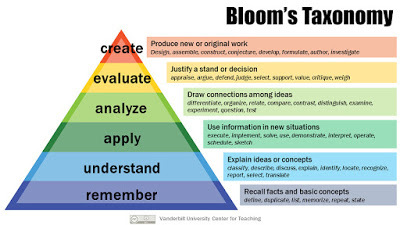
This is a misunderstanding of it. By “high” and “low,” Bloom meant that “higher” forms of thinking were based on “lower” forms, as a pyramid would be based on its foundation. He did not mean that “higher” forms of thought were somehow better than or preferable to lower forms. He could not have; this would require a value judgement, and you can’t get there without an underlying religious assumption, of what the purpose of mankind and of life really is.
It follows that the LOWER forms are of greater utility. So the most time and the greatest emphasis should be on them. This curriculum, instead, calls for a concentration on the HIGHER forms, reading “higher” in ignorance to mean more valuable.
That is, in effect, standing a pyramid on its head. If Bloom is right, it is not likely to be a solid educational foundation.
Note too here the call to look beyond the “literal” meaning of texts. This too is ironically illiterate. In literary theory, looking beyond the literal means looking for metaphor, symbolism, unspoken implication, or allusion. This is difficult—the ability to do so, Aristotle says, is the sign of genius. Unable to do so, the curriculum designers yet again substitute politics.
It must be soul-crushing for any student who is particularly bright.
And one more thing, that sticks out like a sore tongue to any language teacher:
“Teachers need to encourage parents to continue to use their own language at home in rich and varied ways as a foundation for language and literacy development in English. It is also important for teachers to find opportunities to bring students’ languages into the classroom, using parents and community members as a resource.”
This is politics interfering with education. The consensus in the field of language learning is the reverse: one learns a new language fastest through total immersion. Ironically, the best research that this is so comes from Canada. In most language schools, use of the first language is prohibited.
To appease the current dogma of multiculturalism, the curriculum says the reverse.
'Od's Blog: Catholic and Clear Grit comments on the passing parade.
Published on October 19, 2019 15:45
On to Jerusalem!
This really appeals to me as a Hallowe'en costume: a crusading Knight Templar.

'Od's Blog: Catholic and Clear Grit comments on the passing parade.
Published on October 19, 2019 10:56
Daisy, Daisy, Give Me Your Answer Do
This CBC news item may explain why Warren Kinsella has come out so strongly against Justin Trudeau this election: he's been bought. He's working for the Conservatives behind the scenes.
'Od's Blog: Catholic and Clear Grit comments on the passing parade.
Published on October 19, 2019 09:08
October 17, 2019
A Loathsome Cult?
Longtime Liberal backroom eminence, and one time right-hand man to Jean Chretien, has come out rather passionately against voting Liberal-Trudeau this time.
https://torontosun.com/news/national/election-2019/kinsella-why-i-cant-vote-liberal-on-oct-21
One gets the feeling he is not telling the whole story: that he has some personal chip on his shoulder, or that he knows something going about the smoky backrooms that we don't know.
'Od's Blog: Catholic and Clear Grit comments on the passing parade.
Published on October 17, 2019 12:44
October 16, 2019
Look
Is it really getting to annoy you, as it does me, that every candidate begins their answer to every question with the word "look."
And I hate how they always make a fist with the index finger wrapped around the thumb instead of pointing. Nobody but a politician does that. That is from Bill Clinton. That is SO cliche.
And so is how every new government expenditure, whatever it is, is an "investment." Some are, some aren't. That's also from Clinton.
'Od's Blog: Catholic and Clear Grit comments on the passing parade.
Published on October 16, 2019 14:50
Does the Left Hand Know What the Left Hand Is Doing?
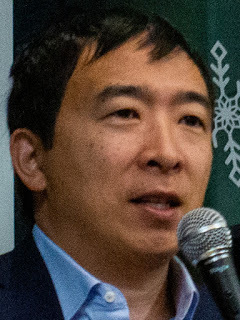 Main man of the Yang Gang.
Main man of the Yang Gang.I was unable to find a live feed last night for the US Democratic Presidential debate. I am only able to review someone else’s selections of highlights today.
Tulsi Gabbard seemed to be appealing for Republican support. She expressly disavowed talk of impeachment and Hillary Clinton’s “deplorables” remark. She spoke of her personal friendship with Trey Gowdy.
This strikes me as good strategy. The rest of the field has been leaning left; she has less competition for Democratic moderates. Biden was doing well on this basis, but Biden is probably flaming out, with the Ukrainian/Chinese scandal. In addition, the Republican race is sewn up. No interest in their primaries. In such a case, Republicans may tend to cross over and vote in the Democratic primaries. So a Republican outreach may help her get the nomination.
And should she get the nomination, it will certainly help her in a general election.
Andrew Yang was the other candidate who seemed to have something to say. The rest were, for me, painful to listen to: it was all boilerplate, sloganeering, lacking any spark of insight. Yang said different things. With his talk of jobs lost to automation and his GAI, he is making a pitch to the working class guys in the rust belt.
And he gives the impression of understanding the new technology, and having some valuable insight. He inspires confidence.
Yang and Gabbard are, I think, in terms of sheer electability, the Democrats’ best options. Gabbard at the debate endorsed Yang’s main plank, the Guaranteed Annual Income. It’s a dream, but together, they’d make a good team. Yang for economic policy, Gabbard for foreign policy.
But something even more interesting. Yang made a strong case that jobs are rapidly disappearing: everyone is seeing their local main street shutting down, and all the automated kiosks now at Target and Macdonald’s. It must be said that the employment figures do not bear this out. Instead, US or Canadian employment is at historic highs. Yet these are jobs being visibly lost—let alone what must be happening in factories. Truck driving is the most common job in Canada, or America, and it looks as though it might be replaced within a few years by self-driving vehicles.
It might be an example of what Marshall McLuhan inaptly once called “the dinosaur effect.” Things in society and technology often seem to be at their highest point of ascendancy just before they collapse. It might be true of the job market. A strong demand for labour may itself hasten the arrival of the machines.
Nobody else on that stage challenged Yang on his claims. They all saw this as a big issue. And I have seen the same said elsewhere—recently, some economist advised that 40% of all American jobs would be gone within a dozen years. Nor is Yang the only guy in Silicon Valley warning of this; and those guys in Silicon Valley have a good track record for seeing what is beyond the horizon.
Now let’s shift focus to the current Canadian campaign, and our most recent leaders’ debate. There, someone made the familiar boilerplate point—can’t recall who, this time—that Canada needed its historically high level of immigration, because we need more workers to sustain our social programs. And everyone present agreed. Not even Maxime Bernier challenges this. He wants fewer immigrants overall, but he wants to select for needed job skills. . He would only cut down on other categories of immigration.
These two universally held truths are plainly incompatible.
If the American Democrats are right, we are setting ourselves up for a pending social catastrophe.
And how is it that nobody is talking about this discrepancy?
'Od's Blog: Catholic and Clear Grit comments on the passing parade.
Published on October 16, 2019 10:56
On Real Leadership
I did not support Trump among his Republican challengers back in 2015-16. Had I been the Republican Party, I would have gone with Jeb Bush. The conventional choice. I privately endorsed Trump in the general, but through gritted teeth. Ironically, I feared that if Hillary were elected, we would all have to go through the turmoil of an impeachment investigation. Over her emails. Which also suggested, it seemed to me, background collusion with either Russia or China. Mere incompetence did not seem a sufficient explanation.
By now, like many others, I am inclined to think that Trump has been an unusually good president. Not just because of a prosperous economy. He knows how to make deals. And that turns out to be an extremely valuable asset in a president.
I did not support Ronald Reagan, either, back in his primary runs. In 1976, sticking with an incumbent president, Gerald Ford, seemed obviously the right path for the Republicans. Even though I would have voted, instead, for almost any Democrat. In the 1980 Republican primaries, I thought they should have gone with George (HW) Bush. In the general, I would have preferred Reagan to Carter, but again, by default.
It shows how wrong I can be.
But not just me. Reagan came to power only due to exceptional circumstances. Trump’s rise was also exceptional: he won the general by a hair, and defying all predictions. So was Lincoln’s—the presidency was his first significant public office. So was Churchill’s, pulled in from the wilderness in a general emergency. Even after he saved the world in the Second World War, people were reluctant to vote for him.
Why are we all like this? Why do we actually resist voting for the best leaders?
I am drawn to this reflection by the odd refusal by the Dems to give Tulsi Gabbard their attention and support. It seems bizarre and almost suicidal to go instead for obvious old hacks like Elizabeth Warren and Joe Biden.
It is, surely, a love of the familiar. The same instinct that brings us xenophobia. People move along in their accustomed mental ruts, and there is an instinctive fear of anything outside them: fear of the unknown.
The problem is that Gabbard, like Reagan or Churchill, does not simply parrot the expected line on the issues. Yet this is a necessary trait in a leader: that they think for themselves, and have core principles.
You see the same thing in the arts—perhaps in all human endeavor. People resist anything that is genuinely fresh and new. They do not want their accustomed ways disturbed. They want décor.
And I, it seems, on the evidence of Trump or Reagan, am as bad on this as everyone.
But then too, there is a reason for this. At least sometime this gut conservatism is wise; that is probably why we have it. It is a good survival mechanism to mistrust the unfamiliar.
Hitler, too, was a leader who came out of nowhere and who seemed to be saying something both new and principled. Or Mao. If some large, impressive, and previously unknown creature emerges from the nearby forest, it is wise to be cautious.
If we could figure out how to make the distinction, between the principled genius and the dangerous demagogue, it would be the key to a great improvement in the human condition.
I think there is a distinction. Leaders like Hitler or Mao looked as though they were acting on principle, but actually had no principles. They were driven only by power. They chose their new principles only strategically to appeal in a time of turmoil. William Manchester, who followed his rise closely, noticed that Hitler said something completely different to each audience--whatever he expected they most wanted to hear. This is why Nazi ideology has always been hard to pinpoint. Mao, similarly, was in no way consistent in terms of which faction he supported within the CCP.
So the best test is a moral test: if a candidate has visibly done something that seems to go against their own career interest, on what seems a matter of principle, they are probably the real deal.
Churchill is an obvious example of this, in his principled opposition to dealing with Hitler and the Nazis, in his warnings of impending war. I think Tulsi Gabbard is also in this category: she hurt her career as a rising Democrat star last cycle by dissenting from the efforts of the DNC to fix the primaries for Clinton. Trump perhaps qualifies with his attacks on the press and political correctness. They have turned out well for him, but is he so savvy as to have foreseen this, or was he just determined to do it anyway?
On this same test, I think Maxime Bernier is the real deal in the current Canadian election. He did not seem to be thinking strategically in coming out against supply management. It is supposed to be an unpopular stand in Quebec. He definitely seemed to buck his own best interests in terms of seeking power by splitting from the Conservatives a year ago. In the normal run of politics, we would have expected Scheer to lose the next election, resign, and then Bernier would be the front-runner to replace him. He gave that up, apparently on principle.
I wonder if they could still coax him back, if Scheer comes up short.
On this same test, the Liberals, if they lose their majority or worse, ought to turn to Jody Wilson-Raybould or Jane Philpott as new leader.
'Od's Blog: Catholic and Clear Grit comments on the passing parade.
Published on October 16, 2019 05:55
October 15, 2019
Why Trudeau Should Cling to Power
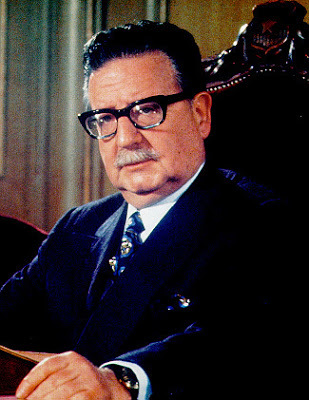 In 1973, Chile's Salvador Allende committed suicide rather than resign as prime minister and vacate the PMO. Unconfirmed reports are that he shot himself in the back with a machine gun.
In 1973, Chile's Salvador Allende committed suicide rather than resign as prime minister and vacate the PMO. Unconfirmed reports are that he shot himself in the back with a machine gun.The polls are now shifting quickly. The likeliest result currently is that the Conservatives win the largest number of seats, buy not a majority. People are reporting this as “a Conservative minority government.” And I see headlines warning that Trudeau may be planning to illegitimately hang on to power anyway.
As if this would be some affront to democracy.
As I understand the Westminster system, Trudeau would be not just within his rights, but right, to stay in power.
I do not say he will; popular opinion has a role here, and may force a new precedent at any time. But by the logic of the Westminster system, the proper thing would indeed be for Trudeau to stay in power and try to form a coalition.
The prime minister is not automatically the leader of the party with the most seats in the house. The prime minister can be, in principle, any member of the House of Commons, or even anyone outside the House, appointed by the Crown as her chief advisor; but this is then immediately subject to their ability to demonstrate the confidence of the House.
Trudeau has been appointed prime minister. He need not resign, now, unless he loses the confidence of the House. Until and unless a vote is held, nobody can assume he has—so long as no other leader can prove that they command a majority. The proper thing, then, is for him to face the house and see if he still has their confidence.
If any one other party holds a majority of the seats in the House after the election, it is simply wasting everyone’s time if the previous PM does not step down. So he will, so as not to look too desperate for power. But if no one party does, the current prime minister has the right to see if he can continue to command a majority: he has first crack at forming a formal or informal coalition. To waive that right to someone else is similarly wasting everyone’s time; if they cannot, it simply comes back to him, and two prime ministers have had to resign in rapid succession instead of one.
Politically, it might be unwise for him to hang on if it is clear his opponent has a better shot at forming a coalition than he does. That too might look like clinging to power. But that’s a bit of a moot point; he will ask around pretty quickly after the election and see what he can come up with, and his chief opponent will do the same, and it will be clear pretty quickly to everyone involved who has a majority coalition and who does not.
After this election, Trudeau looks to have the better shot at a coalition—since the probable third-largest party, the NDP, has already ruled out any coalition with the Tories. So it is quite likely to be his proper course to hang on to power even if the Tories hold more seats. Popular opinion may force him to resign anyway, but that is not the way it is supposed to work.
Either way, I now expect a very unsteady minority government that is likely to fall within the year.
'Od's Blog: Catholic and Clear Grit comments on the passing parade.
Published on October 15, 2019 13:09



